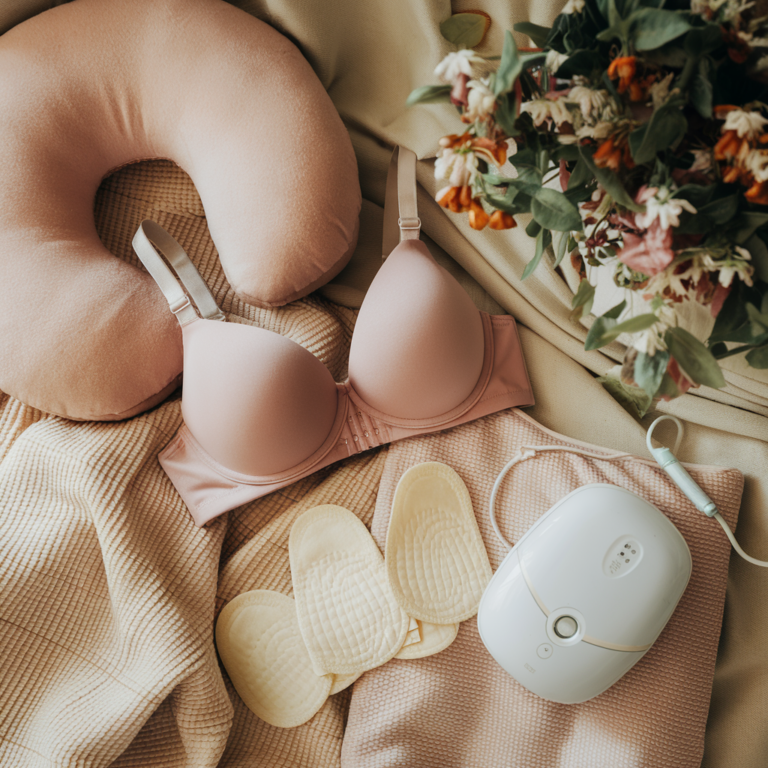Hi moms! I am here to talk about something many of you think about: breastfeeding tips at night!

Let’s be real, night feeds can be… well, tough! You’re tired, the baby might be sleepy, and the bed is calling your name. But don’t worry! You’re not alone, and there are ways to make night breastfeeding easier, maybe even nice (okay, maybe not fun at 3 am, but much easier!).
If you’re pregnant, breastfeeding now, or caring for a little one, you’re in the right place. We’ll talk about simple, real breastfeeding tips to help you with night feeding. Less feel like a zombie, more like a super mom, even at night!
So, get a warm drink (decaf for breastfeeding moms!), relax, and let’s get ready to handle night breastfeeding together! We’ll laugh a bit, learn a lot, and remember we’re all doing great.
Is Breastfeeding at Night Different? Let’s See!

Are breastfeeding tips different at night? Is it just… feeding? Yes, it’s still feeding your sweet baby breast milk, which is amazing anytime! However, night breastfeeding is a little different, and it helps to know why.
First, our bodies are smart! The hormone that makes milk is higher at night. So, you make more milk for night feeds. Cool, right? Your body works hard to feed your baby even when you’re resting.
But, the main difference is often… you. Night feeds happen when you’re most tired. That excited new mom energy might be gone, and you’re really feeling the lack of sleep. This can make night feeds feel harder, and you want to make them fast so you both can sleep again.
Your baby might also be different at night. Some babies are sleepier at night, and feeds might be slower. Others might feed a lot in the evening and early at night, to get ready for a longer sleep (hopefully!). Every baby is different, and night feeding will be too. Knowing this helps you find breastfeeding tips for you and your baby at night.
Remember, night feeds are really important. Breast milk at night can help babies sleep better. So night feeds aren’t just food, they help with sleep too. And, night feeds help keep up your milk supply, especially at first.
Get Comfortable: Best Breastfeeding Positions for Night
Being comfy is SO important for night breastfeeding. Trying to feed your baby all awkwardly in the dark at 3 am is no fun. Finding comfy breastfeeding positions for the night makes things much easier. Let’s look at some ways to make night feeds better!
1. Side-Lying Position

This is a top pick for night breastfeeding, and for good reason! Lying down to breastfeed is so helpful when you’re tired.
- How to: Lie on your side facing your baby, tummy to tummy. Use a pillow behind you and maybe one under your head. Line up your baby’s nose with your nipple. When they latch, you can relax and even doze (safely, we’ll talk about that!).
- Why it’s great for the night: You can rest while feeding. Stay in bed, less waking up. It’s great for the night because you’re already lying down!
2. Laid-back Position

This is about leaning back and letting gravity help.
- How to: Lean back in bed or on a couch, with pillows behind you. Put your baby on your chest, tummy down, lying on you. Support their body and let them find your breast.
- Why it’s good for the night: It’s very relaxing for both of you. It helps baby latch well, and it’s calming for night feeds. Also good if you had a C-section, less pressure on your belly.
3. Cradle Hold (Night Version)

The usual cradle hold can work at night too, with a few comfy changes.
- How to: Sit up in bed with lots of pillows behind you. Use a breastfeeding pillow or pillows to lift your baby to your breast, supporting their head in your arm.
- Night change: Use lots of pillows to help your back, arms, and baby. Be as relaxed as possible. Make sure you’re supported so you aren’t tense. You can even lean against the headboard with pillows, kind of sitting back a bit.
Comfort Tips for Night Positions

- Pillows Are Key: Use lots of pillows to help your back, arms, and baby. Try different ones to see what’s best.
- Keep Things Close: Before you start a night feed, have water, a snack, your phone (silent!), burp cloths, etc. nearby. Less moving once you’re comfy is good for staying sleepy!
- Help Your Wrists and Shoulders: Holding a baby can strain you. Use pillows to support your arms and baby, and don’t hunch over.
- Listen to Your Body: If a position hurts, change it! Breastfeeding shouldn’t be painful.
Finding comfy breastfeeding positions for the night takes time, but once you do, night feeds get much easier and more restful for you and your baby. And being comfy isn’t just nice, it’s important for good breastfeeding, especially at night!
Breastfeeding Lying Down: Your Night Feed Best Friend

Let’s talk more about lying down breastfeeding! It’s the best position for night feeds and for great reasons. Lying down breastfeeding can really change your nighttime and sleep (or as close to sleep as you can get!).
Why Lying Down Breastfeeding is Great for Night
- Rest for Mom: This is the best part! Lying down lets you rest and even doze while the baby feeds. Less moving and staying flat helps save energy and get back to sleep fast after a feed. Every minute of rest helps!
- Easier Night Feeds: Getting up and sitting for every night feed feels long. Lying down breastfeeding means you don’t have to fully wake up, making night feeds easier and less tiring.
- Helps Baby (and You!) Sleep: Being close and skin-to-skin while lying down is very calming for babies. It helps them settle and feed calmly, and maybe sleep better after. And when the baby is calm, you’re more relaxed and sleepy too!
- Good for After Birth: Lying down breastfeeding is gentle on your body, especially after giving birth. It’s great if you’re healing, whether from a vaginal birth or C-section, because you can rest while feeding your baby.
- Easy for Bed-Sharing (Safe Bed-Sharing): If you bed-share safely with your baby (following safe rules – more on safety soon!), lying down breastfeeding is super easy. You can feed your baby fast in bed, without getting up much, making it easier to respond when the baby is hungry at night.
Tips for Safe Lying Down Breastfeeding at Night
- Safe Sleep Area is a Must: Before lying down to breastfeed at night, make sure your baby’s sleep area is safe. This is so important.
- Firm Bed: Use a firm mattress. Not soft ones, waterbeds, or couches.
- Flat Bed: The bed must be flat, with no gaps where the baby could get stuck.
- No Loose Stuff: Keep pillows, and blankets away from the baby’s face. These are dangerous. You can use a light blanket to your waist.
- No Smoking, Alcohol, or Drugs: Don’t bed-share if you or your partner smoke, drink, or take drugs that make you sleepy. This is not safe for the baby.
- Healthy Baby: Bed-sharing usually isn’t for babies born too early, too small, or with some health problems. Ask your doctor if you’re not sure.
- Position: Always put the baby on their back to sleep (after feeding and you are awake), even if you breastfeed lying down.
- Practice During the Day First: Before trying lying down breastfeeding at night, practice when you’re awake. Get used to the position and make sure the baby is latching and feeding well.
- Position Baby Right: When lying down, put your baby’s tummy to the tummy facing you. Make sure their nose lines up with your nipple and their head is tilted back for a good latch. Support their back so they don’t roll away.
- Stay Awake Enough: While you want to rest, stay aware of your baby while feeding lying down, especially at night. Don’t fall into a deep sleep while the baby is still feeding. When the baby is done, gently take them off your breast and put them safely on their back in their own safe sleep place (like a bassinet next to your bed), or make sure you are safely bed-sharing if you choose that.
- Use a Nursing Bra or Top for Lying Down: These can help keep your breast easy to reach and support when lying down, making night breastfeeding even easier.
- Start Slowly with Night Lying Down Feeds: Don’t feel like you have to lie down for every night feed right away. Start with one night feed and slowly do it more as you and baby get comfy and sure of yourselves.
Lying down breastfeeding is a great way to feed at night. When done safely, it can really help you rest more and make night feeds much easier. It’s about finding what works best for you and baby, and always being safe first.
Night Feeding Signs: What Your Baby is Telling You

Knowing your baby’s feeding signs is key for good breastfeeding anytime, but especially at night. Seeing those early hunger signs can help you feed your baby before they get too upset, and make night feeds faster, calmer, and better for everyone.
Why Do Feeding Signs Matter at Night?
- Catch Hunger Early: At night, you might wait until the baby is fully awake and crying to feed. But crying is a late hunger sign. Feeding earlier means you can feed your baby when they are just waking up and still sleepy, often making feeds faster and easier and getting back to sleep faster.
- Stop Baby from Waking Up Too Much: Waiting until baby cries means they are really awake and upset. This can make it harder for them to latch well and sleep again after feeding. Feeding early helps keep the baby more sleepy during night feeding.
- Better Night Feeds: Feeding a calm baby is usually easier. They latch better, feed well, and get the milk they need without much fuss. This means shorter feeds and more sleep for you!
- Baby Knows Best at Night: Following your baby’s signs is important for feeding. It’s about trusting your baby to show you when they are hungry and listening to their natural feeding needs, even at night.
Early Night Feeding Signs to Look For

- Moving Around in Sleep: Your baby might start to move, stretch, and wiggle in their sleep. This is often one of the first signs of hunger.
- Turning Head and Rooting: They might turn their head side to side, like looking for the breast, or start rooting (opening their mouth and moving their head like looking for a nipple) on your chest or bed if you’re holding them.
- Sucking on Hands: Putting hands to mouth and sucking on fingers is another hunger sign. While babies suck hands for comfort too, with other signs, it’s often hunger.
- Lip Smacking: Making small lip noises can also mean they are hungry.
- Soft Fussing: Before crying hard, your baby might make soft fussy sounds or little cries.
Late Hunger Signs (Try to Feed Baby Before This at Night!)
- Crying: Crying is a late hunger sign. You should always feed your baby when they cry, but feeding earlier can make night feeds much easier.

- Getting Upset and Red: A crying baby might get very upset, tense up their body, and get red in the face.
Tips for Seeing Night Feeding Signs
- Keep Baby Close at Night: Having your baby close at night (in a bassinet or crib in your room, or safely bed-sharing) helps you see those early feeding signs. You’ll notice their small moves and sounds more.

- Watch Baby Before Fully Waking Up: When you hear your baby stir at night, watch them a bit before getting up. Look for those early signs like moving, rooting, or hand-sucking.
- Offer Breast When You See Hunger Signs: Don’t wait for the baby to be wide awake or crying. Offer your breast as soon as you see those early hunger signs. They might latch and feed while still half-asleep, which is great for a fast night feed.
- Trust Yourself: As you know your baby, you’ll learn their signs. Trust your gut! If you think your baby might be hungry, even if the signs are small, offer your breast. It’s always okay to feed when the baby wants.
- No Strict Night Schedule: Night feeding should mostly be based on the baby’s needs at first. Forget set times at night and feed when your baby shows hunger.
By seeing your baby’s signs, you can change night feeds from possibly hard times into smooth, quick, and restful times for both you and your baby. It’s about listening to your baby and knowing they know when they need to feed, even in the quiet night.
Get Breastfeeding Help: You’re Not Alone at Night!

Breastfeeding, especially night breastfeeding, can feel lonely sometimes. Those long night hours can be quiet, and when problems happen (they do!), it’s easy to feel lost. But remember, Mom, you are not alone! Get breastfeeding support – it’s smart, not weak, and it can really help your breastfeeding, especially at night.
Why Breastfeeding Help is Important, Especially at Night?
- Night Challenges Are Real: Night breastfeeding has its own problems: being tired, sleep problems, maybe latch issues in the dark, worries about baby’s sleep and feeding at night, and just being worn out from night after night of feeds. Breastfeeding help can guide you through these nighttime issues.
- Feeling Alone: Night feeds are often when everyone else is sleeping. This can feel lonely, especially when you’re new to motherhood and breastfeeding. Talking to breastfeeding support shows you that you’re part of a group of mothers going through the same thing.
- Solving Problems in the Dark: When you’re tired at 3 am, fixing breastfeeding problems feels impossible. Breastfeeding helps people give good advice and tips to help with latch problems, milk supply worries, breast pain, or baby fussiness, even at night (or, you know, when they are awake!).
- Feeling More Confident: Breastfeeding takes learning, for you and the baby. It needs time, patience, and practice. Breastfeeding helps give you encouragement, and support, and makes you feel better, especially when you’re down during those hard night feeds. Hearing “You’re doing great!” can really help at night.
Where to Find Breastfeeding Help (Even for Night Problems)

- Lactation Consultants (Breastfeeding Experts): These are the best for breastfeeding help. They are trained people who know a lot about breastfeeding. They can give you advice, check latch and feeding, help with milk supply, and give you personal breastfeeding tips. They might not be there at night, but talking to one about night breastfeeding can really help. Many do online help too! Ask your doctor or hospital, or look online for experts near you.
- La Leche League (LLL): LLL is a group that helps with breastfeeding by connecting moms. They have local groups everywhere. LLL leaders are moms who have breastfed and can give info, support, and help at meetings and by phone and email. LLL meetings are great for meeting other breastfeeding mothers and sharing stories, and their online stuff is always there.
- Local Breastfeeding Groups: Many hospitals, birthing centers, and places in your town have breastfeeding support groups. These groups let mothers meet, share tips, and get support from each other and helpers. Ask your local hospital or health place for groups near you.
- Online Breastfeeding Groups and Forums: Online support isn’t the same as expert help, but online breastfeeding groups can help find info, ask questions, and connect with other breastfeeding mothers anytime. Make sure to use good websites and be careful about medical advice online. Look for groups by breastfeeding groups or experts.
- Your Doctor or Nurse: Your doctor or nurse can also help with breastfeeding and tell you about experts. Don’t wait to ask your doctor if you have any breastfeeding worries, even nighttime ones.
Tips for Getting Help at Night (or close to it)

- Write Down Questions: When you ask for breastfeeding support, especially when talking to an expert, write down what you want to ask about night breastfeeding. This helps you use your time well and get the answers you need.
- Use Online Help: Many breastfeeding support groups have websites with answers, articles, and tips you can use anytime. Use these to find answers to common night breastfeeding questions, even in the middle of the night.
- Ask for Help, Even for “Small” Things: No breastfeeding worry is too small to ask for support. If something feels wrong or night feeds are hard, ask for help. Getting help early can stop bigger problems later.
- Remember Help is There Beyond Daytime: Expert help might be during the day, but online stuff, phone lines, and mom groups are often there at different times, giving you support even when the night feels long and hard.
Breastfeeding support is about more than just fixing problems; it’s also about feeling sure, and strong, and knowing you have people helping you. Especially with night breastfeeding, remember you don’t have to do it all alone. Get breastfeeding support, Mom, and you’ll handle those night feeds more easily and feel better about it!
Breastfeeding Tips for a Bit More Sleep at Night!

Ah, sleep! The dream for new parents! While new babies need to feed a lot, even at night, there are breastfeeding tips to help night feeds so you can get a little more sleep (for you and baby!). Let’s be real – we’re not talking full night’s sleep right away, but every bit of extra sleep is amazing!
What to Expect for Night Sleep and Breastfeeding
Before we get to tips, let’s be honest. New babies have tiny tummies and need to be fed often, usually every 2-3 hours, day and night, at first. Night feeds are normal and needed for them to grow and do well, and to help your milk supply. Trying to make night sleep much longer or skipping night feeds too soon can hurt your baby’s health and your breastfeeding.
But, as your baby grows (around 3-4 months and older), their tummy gets bigger, and they might start to sleep a bit longer at night. The tips below help gently help this happen and make night feeds a little better for more sleep, without hurting your baby’s food needs or breastfeeding.
Breastfeeding Tips to Help Baby Sleep a Bit Longer at Night (Slowly, and Let Baby Lead!)
- Feed Baby Well During the Day: Make sure your baby gets lots of good feeds during the day. Feed them whenever they are hungry all day. Wake your baby to feed if they sleep more than 3-4 hours in the daytime at first. Babies who feed well in the day often (but not always!) sleep a bit longer at night.
- Full Feeds, Not Just Snacks: Help your baby have full feeds each time, not just quick snacks. Let them feed at one breast until they stop on their own or slow down a lot. Then offer the other breast. Use breast compressions (gently squeeze your breast while baby is feeding) to help milk flow and keep baby feeding if they get sleepy at the breast.
- Evening Cluster Feeding: Many babies naturally feed a lot in the evening (feed often for a few hours before a longer sleep). Let them! Feed often in the evening to help the baby get full before nighttime. This sometimes helps them sleep a bit longer on the first night.
- Bedtime Routine: Make a calm bedtime routine for your baby. This could be a warm bath, gentle rub, quiet time, and a last breastfeed before sleep. A set bedtime routine tells your baby it’s time to calm down for the night and can help with sleep.
- Good Sleep Room: Make your baby’s sleep room dark, quiet, and cool (and yours too!). Darkness says it’s night and helps with sleep. A cooler room is safer for baby’s sleep.
- Feed Baby Quickly at Night (Early Signs!): As we said before, feeding baby when you first see hunger signs at night can make feeds faster and easier, less waking up for you and baby. Feed your baby as soon as you see those early hunger signs before they are fully awake and crying.
- Try a Dream Feed (Maybe, and if Baby Likes It): A “dream feed” is feeding your baby while they are still mostly sleeping, usually around 10-11 pm, before you sleep. Some parents find a dream feed can help a baby sleep a bit longer at first night. But dream feeds don’t work for all babies, and some say not to do them as they can mess up a baby’s natural sleep. If you want to try, gently offer your breast while baby is sleeping, and see if they latch and feed without waking up. If it doesn’t work, or the baby fully wakes up and can’t resettle, maybe it’s not for your baby.
- Slowly Reduce Night Feeds (When Baby is Older, and If Baby is Ready): As your baby gets older (6+ months and older, the doctor says it’s okay), and if they eat solid food well and are growing well, you can slowly help them sleep longer at night and feed less at night if they seem ready. This should always be led by baby and slow, never forced. Never cut back on night feeds for a younger baby (under 6 months) without asking a doctor.
Things NOT to Do to Help Baby Sleep Longer (Breastfeeding Edition!)
- Don’t Skip Night Feeds Too Early: Don’t try to stop night feeds too early (especially in the first few months) to get more sleep. Night feeds are key for your baby’s health, growth, and your milk supply.
- Don’t Force Baby to Sleep Through the Night: “Sleeping through the night” happens when babies are ready. Don’t force it or compare your baby to others. Just make a safe and good sleep place and listen to your baby’s needs.
- Don’t Ignore Baby’s Night Hunger: Always feed your baby when they are hungry, even at night. Don’t wait to feed or try to just get them back to sleep if they seem hungry.
- Don’t Use Formula Just for Sleep Without Asking a Doctor: Switching to formula at night to try to get longer sleep should only be done if a doctor says to, and only if there’s a real medical reason. Breast milk is perfect for your baby, even at night.
Read more: Breastfeeding Education for Parents: Your Fun & Comprehensive Guide to Breastfeeding
Final Say

Remember, mom, newborn sleep is just like this – broken and you don’t know what to expect! Focus on making night feeds comfy and fast, listen to your baby’s signs, be safe with sleep, and get breastfeeding help when you need it.
As your baby grows, night sleep will get better, and you will sleep more again! Hang in there!
Eager for More Parenting Wisdom?

Breastfeeding is a journey, and I’m here to support you every step of the way. If you’re looking for even more practical advice, real-life tips, and encouragement, be sure to check out my YouTube channel!
Whether you’re tackling common breastfeeding challenges or just need a confidence boost, you’ll find a wealth of resources to help you thrive on this amazing journey. Click here.







